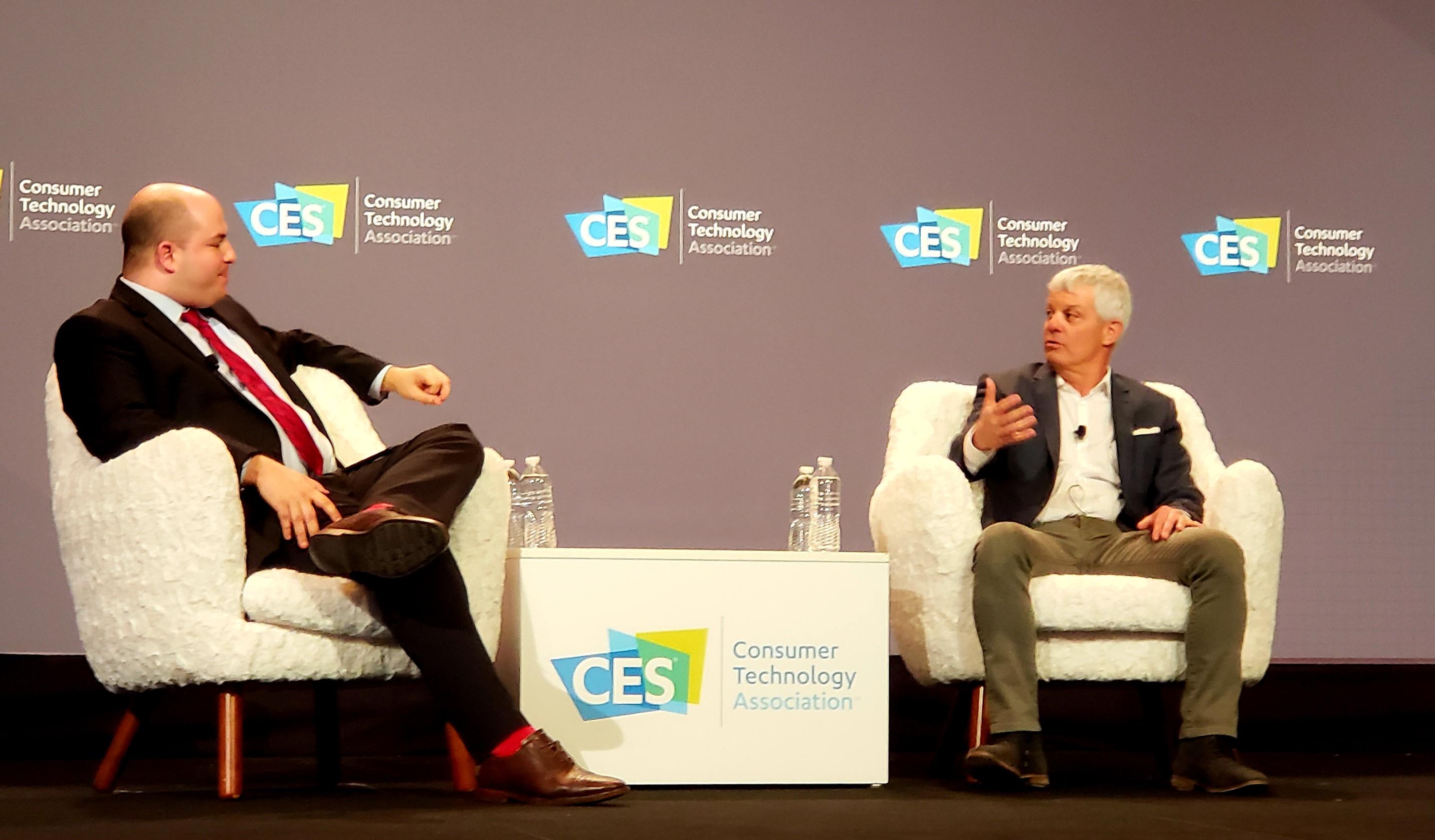Live From CES: Turner’s David Levy Is Bullish on Sports TV; Will Gambling Spur Growth?
Exec was interviewed by CNN’s Brian Stelter at the big show in Las Vegas
Story Highlights
Interviewed at CES by CNN’s Brian Stelter, Turner President David Levy revealed his optimism for the sports-TV industry, given the ability to watch content nearly everywhere and the impending arrival of sports gambling, which he says will drive viewership even higher. And no, he doesn’t see a bubble.

Chatting with CNN’s Brian Stelter (left) at CES, Turner President David Levy said he is bullish on the opportunities for sports TV.
“Sports is just going up,” he said. “Honestly, if you have a quality sports league and you’re doing things right, just stay the course. I don’t think there’s a bubble,” he added. “I just see opportunity.”
The key is that, for many Americans, sports is the last genre of appointment TV and that TV has been redefined to be about the content, not the device hanging on the wall. The evolution of TV sports and its move to OTT and social-media platforms will keep it in a prominent position. And things like the NBA partial-game packages, which provide an alert from Bleacher Report that a game is close and allow the user to pay 99¢ to watch the end of the game, are only the beginning of a tight relationship.
Levy predicted that, in the future, sports-content owners will be able to allow fans to watch a game for 99¢ and will also be able to ask if they want to bet on it. “We [will be able to] give a referral to MGM, Caesars, or FanDuel and benefit.”
Gambling could make a big difference with mid-tier and smaller leagues that are starting to grow. The National Lacrosse League, for example, is interested in betting. If you bet on sports games, the thinking goes, you are 80%-90% more likely to watch more of the event.
“We are big believers that gambling is a big part of the future,” Levy said. “Bleacher Report reaches a third of all [fans ages] 18-34 every month. So BR Gaming will be a big part of what we are going to do.”
There are four ways Turner could monetize gambling. First is to be a sports book, although Levy does not think that makes sense.
“But we could develop content for ourselves or license it to MGM or Caesars and others who want content,” he said. iStream Planet, which Turner owns, will also see an uptick in the need for quality streaming services.
“And then we get the referral business,” he continued. “So there are some new opportunities.”
There is, however, one industry company that needs to catch up with the times: Nielsen. Levy opined that the industry has moved well beyond the type of viewer metrics used in 1960 and dayparts and that, if Nielsen doesn’t more quickly to figure out how to measure multiplatform audiences, someone else will.
Levy also discussed The Match, the golf match between Phil Mickelson and Tiger Woods that saw a PPV effort run into challenges with respect to customers’ being able to sign in and purchase the match.
“We learned that, on Black Friday, a lot of people go online and buy stuff, and we learned we were short on capacity with what we needed for the pay wall,” he said. “But we had 750,000 people watching on BR Live, and the app was only three months old. It’s a winning format, and we have to figure out a way to have The Match 2.”
PPV issues aside, the big win for The Match from Levy’s perspective was that it allowed the assets in the combined Turner and AT&T family to demonstrate what the company is capable of.
“We could show all the assets, BR Live, PPV on DirecTV,” he said, “and we also used HBO for the 24/7 show.”
Looking ahead to when the merger of Turner and AT&T is approved, Levy said that having the 170 million touchpoints AT&T has with its mobile-device and distribution business portends great things: for example, CNN and BR Live preloaded on AT&T phones.
“And, on DirecTV,” he added, “we could have another feed around sports betting. So there are other opportunities.”
He also discussed what he called his three A’s: audience, building one across different platforms; addressability, the ability to market different viewers different products; and attribution, telling an advertiser what happened after the viewers saw an ad. The last requires some negotiation with the advertiser to ensure that the definition of a successful outcome makes sense for all parties.
“You have to negotiate what we can and can’t deliver,” he explained. “We won’t do a deal where the attribution is if someone buys a car, but it might be if they go to a website and build their car. You have to agree on the outcome early.”
The reason addressability and attribution are important is that, done right, they can allow the ad inventory to shrink.
“Less is more when it comes to reducing ad loads,” he explained, “but we can do that only if we get addressability and attribution.”
Will Google or Facebook get into the big-time sports rights?
“Facebook and Google are involved with highlights, scores, and some periphery live games,” he pointed out. “But they are not in the production business, so they would have to do that. It doesn’t mean the leagues won’t sample them, but I think the primary leagues and games will stay on broadcast.”
He closed out his discussion with reflections on what Turner founder Ted Turner would think if he were at CES this year and saw the larger industry trends.
Said Levy, “He would be bullish on TV because he was bullish on content and always said you need quality programming.”
